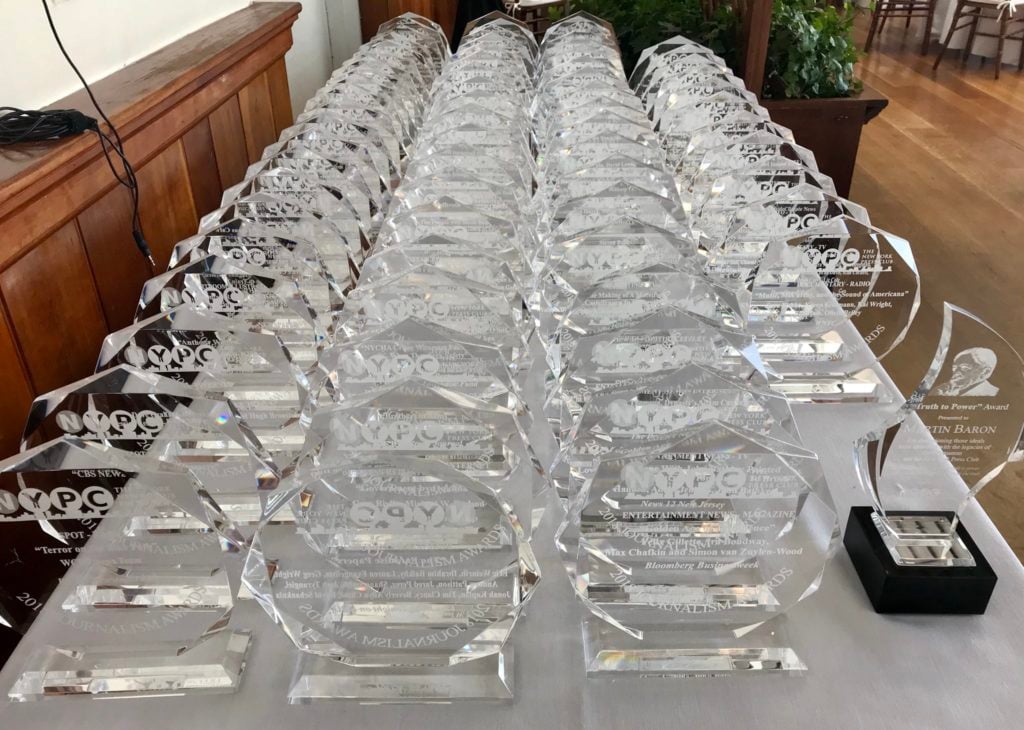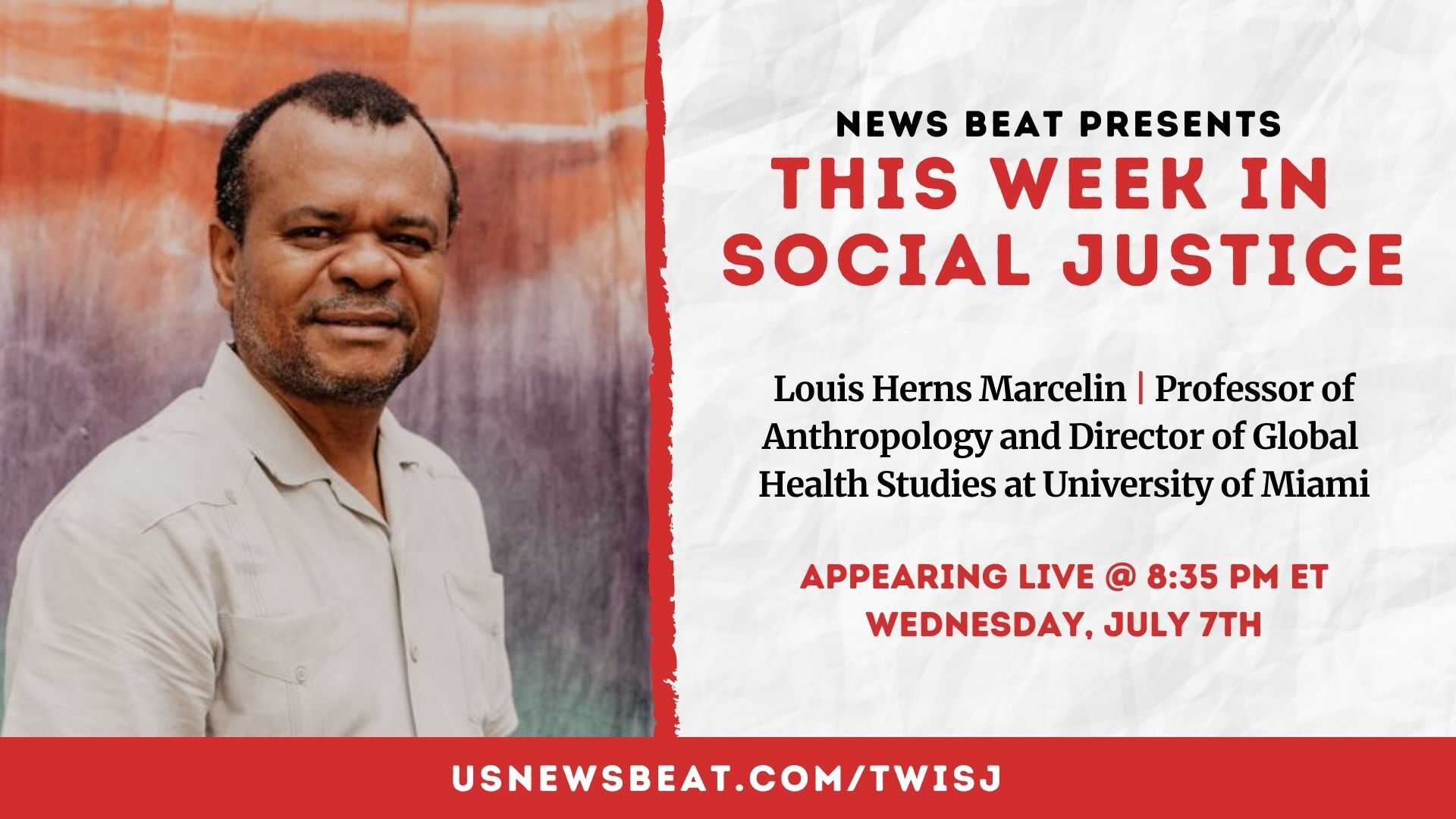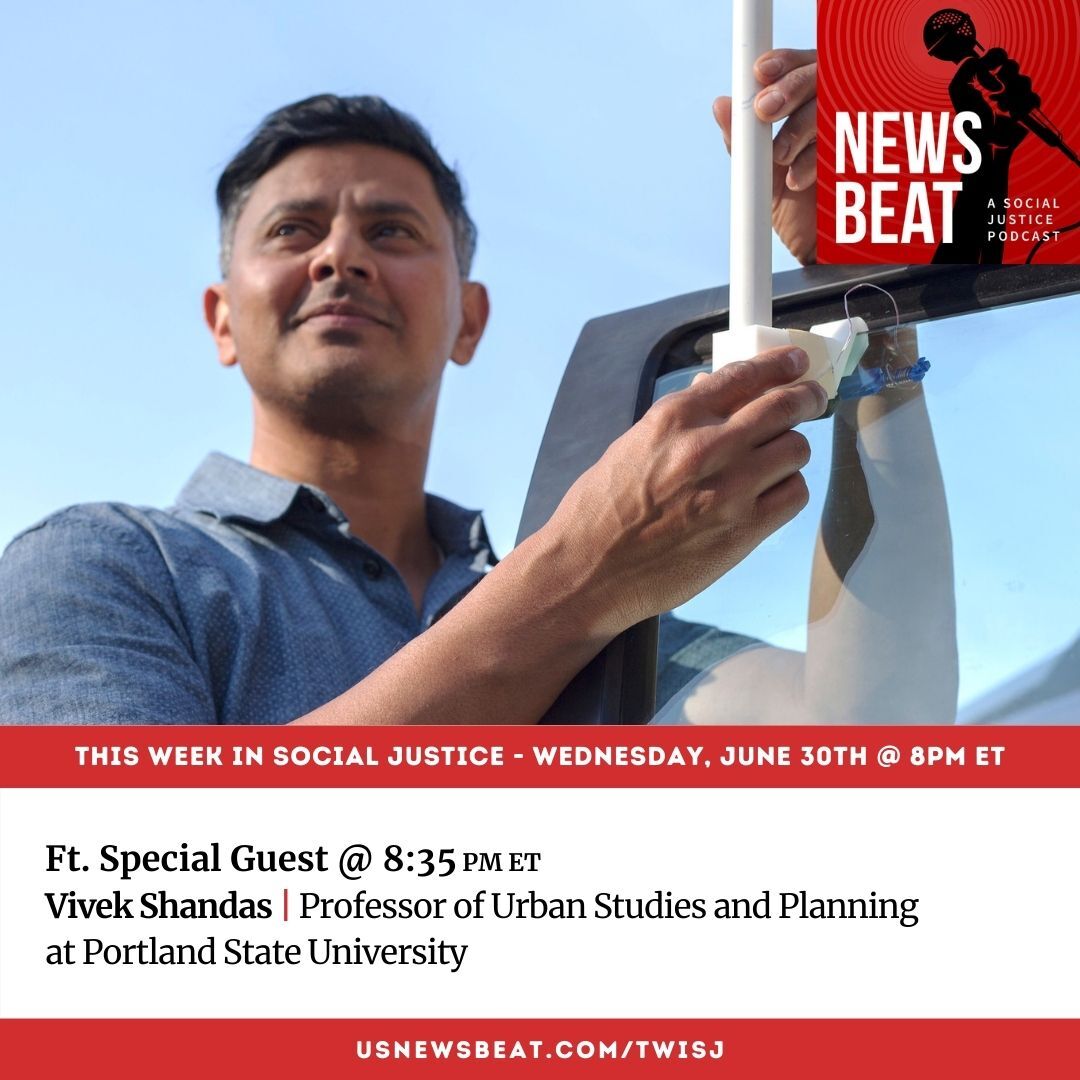This is a segment from our May 19, 2021 edition of This Week In Social Justice.
Philadelphia District Attorney Larry Krasner easily secured victory over his Democratic primary challenger this week, potentially giving the one-time outsider a mandate to further reform a system he's previously derided as overly punitive and unjust.
Krasner proclaimed himself the winner at around 11 p.m. Tuesday, after running up the score against his opponent, Carlos Vega, a former homicide prosecutor that Krasner himself fired after his seemingly shocking victory in 2017.
Krasner is effectively the flag-bearer for the still-emerging progressive prosecutor movement in the United States, which has seen unlikely candidates toppling powerful incumbents. Krasner is now an established DA and has been heralded by many on the left for pursuing previously elusive reforms, from declining to prosecute certain drug crimes and reducing the number of people under community supervision, to empowering his office to review past convictions, leading to the exoneration of 20 people since 2018.
Don't ever miss This Week In Social Justice! It airs every Wednesday at 8 p.m. EST on Facebook, YouTube and Twitch. You can set reminders to receive alerts when we go live.
The election came as many communities throughout the United States were contending with a significant spike in homicides, Philadelphia included. Despite the national surge in such cases, Vega, backed by a police union that was particularly hostile toward Krasner, tried to connect the sitting DA to the wave of violent crimes.
Voters, it appears, were unconvinced, which could suggest communities are becoming more aware of the policies undergirding the criminal justice system, and that so-called "tough-on-crime" rhetoric may not be as convincing as it once was.
To help put Krasner's victory into context, we reached out to Daniel Nichanian, founder and editorial director of The Appeal: Political Report. You can watch Nichanian's interview or read the below transcript, which has been edited for clarity.
News Beat: Daniel, remind everyone who Larry Krasner is and how he came to fame.
Daniel Nichanian: "Sure. So it's a very interesting moment right now for for DA politics, for criminal justice politics. So just the big picture first for people who may not know who even Larry Krasner is. So in 2017, in the DA race, the race for chief prosecutor in Philadelphia, Larry Krasner, won the primary and then the election and that was very unusual, because he had no experience himself as a prosecutor or in law enforcement writ large. His own experience was as a criminal defense attorney and a civil rights attorney, and he actually had already clashed for a long time with law enforcement, had filed lawsuits against law enforcement in Philly. And so his election was really a catalyst for a lot of conversations, nationally, around the role that prosecutors can play in changing the criminal legal system from the inside. You know, he's not the first person who ran on criminal justice reform in a DA race. But the fact that he was such an outsider to the system; in fact, the fact that he had spent his career fighting the system, kind of changed the expectations of what is even possible to talk about in these elections. And over the past four years, Krasner has sort of remained kind of an emblem for the national efforts to use DA offices to really change the criminal legal system. Frankly, both for its proponents, I've talked to so many candidates for prosecutor around the country over the past three years who have specifically said that Krasner's victory was inspiring to them.
"A lot of people who aren't prosecutors themselves, who pointed to that victory as a reason why they thought it was even a thing for them to run for prosecutor, but also for for the opponents of criminal legal reform. [Former Attorney General] Bill Barr under the Trump years, often pointed to Krasner as an example of the reform movement run amok. A lot of people in the police union in Philly was very, very hostile to Krasner and fought him for four years. And then that brings us to the election this week, to cut a long story short, when Krasner faced a former prosecutor, who he himself had fired effectively as soon as he came into office Krasner fired some prosecutors, effectively saying your approach, your practices have been too in line with a very punitive approach, and he fired them. And then one of them ran ran against him this year, Carlos Vega, attracting support from the police union locally. And just a lot of attention nationally, a lot of articles written about whether the progressive movement is running out of breath, stuff like that. And then the result yesterday was that Krasner won with 65 percent of the vote. So that's kind of the arc of what just happened yesterday. And yeah, it's a big deal for these conversations around what criminal justice reform right now."
Interested in the Progressive Prosecutor movement? Listen to these News Beat podcast episodes:
NB: You and your colleagues have done a great job, of detailing why the election is important from a policy perspective, whether it's dismissing criminal charges for drug possession, reducing the number of people under community provision, or overturning past criminal convictions. Can you talk a little bit about these policies in the context of his re election, and to the extent to which his primary opponent wanted to roll them back?
DN: "That's a particularly great question when it comes to the elections, because we're not used to talking about the policy that these people implement, right? People for a long time just ran on things like I'm going to be fair, or I'm going to be tough. And that's kind of all that we got from prosecutors. And so it's very important for me and for our work at The Appeal to really drill down and explain to people, this is what the prosecutor does, this is what the prosecutor changes. So some of the examples you just mentioned, are great examples. So one thing for instance that Krasner has done in office is effectively drop a growing share of the charges for drug possession and effectively he's saying that drug possession and addiction is not something for the criminal legal system to be involved with, that that only makes makes things worse, that bringing addiction into the court system like that is going to make things worse. And the data, we ran a chart of the soaring share of of cases dropped for drug possession under Krasner's office that is really in and of itself a telling illustration of just what a DA an do. And that's something for instance that Carlos Vega was talking about, using other ways of avoiding jail time or prison time and putting people in what's called drug courts, which are still a form of prosecution, but that was a form of contrast, for instance, that came up. Another form of contrast that came up was DAs can protect immigrants from various sorts of immigration consequences. When someone who's not a citizen comes into contact with law enforcement or the court system that can have very, very bad consequences for their immigration status, if they're illegal and for their deportation, if they're not.
"And Krasner had created an office within the DAs office to find ways to charge people or sentence people in a way that would circumvent the immigration consequences. So those are specific examples of the sort of powers judges have. Obviously, then we talk about seeking lower sentences, seeking lower bail for people to avoid pre-trial detention. And Vega's argument really was Krasner's attempt to lower incarceration were going to harm the city, that was effectively a tougher on crime argument; though, and I will end here, what's interesting in the election, really, I think, is that Vega in some ways was not fully embracing that old school, tough on crime message. He was running with the support of the police union. And he was having all this national coverage of whether reform versus tough on crime is more appropriate. But in a lot of the things he said he wasn't fully embracing the idea that he wanted to reverse Krasner's policies, as though the movement has come so far, the conversation has come so far, that we're no longer in 2017 or 2013. And those same arguments will no longer hold sway."
NB: Can you talk about the role of unions in endorsing DA candidates and whether their power has diminished?
DN: "We have obviously come come to a point where it's become obvious that a lot of arguments that four years ago would have would have seemed like non-starters in elections are actually very successful. We've seen that. And I think that that's what's important to add to the context that I've said so far, especially for people who haven't followed this movement very closely. In the time between 2017, Krasner's first election, and today, it's been a sea change around the country, that just over the past couple of years, people who have won on platforms similar to Krasner include places like Los Angeles, places like New Orleans, Ann Arbor, parts of Arizona and Virginia, parts of Massachusetts, a lot of different cities, a lot of suburban areas. And so the context has changed a lot. On the other hand, we are still in a place where the mere fact that the police union is attacking someone, the mere fact that prosecutors within a DA's office is attacking the elected prosecutor, is in and of itself enough to generate a wave of coverage that that talks about the anxieties toward criminal justice reform as though we are still in the '80s. We really are seeing that right now in LA, where George Gascon who's the elected DA of L.A., just won in November, ousting the incumbent DA there in November, on the platform that broadly speaking, let's say similar to Krasner's, if not on some aspects goes further. He has faced a lot of resistance from people who are already in the office. And if you look at the media coverage in LA, there's this drip, drip of ADAs, assistant prosecutors, people in the Sheriff's Department, who are getting emotional in interviews with the media about the fact that they're no longer able to seek as high sentences, or as high bail, and that in and of itself is a story, right, this prosecutor who is getting teary about not being able to seek the death penalty. So that in and of itself is still there. And the expectation that Krasner would get more trouble than he ended up getting in the primary is indicative of that."
NB: I wanted to ask you a little bit about the homicide spike in 2020. So obviously, opponents are gonna blame that on progressive prosecutors. But what do the criminologists say about this? Or what does the data point to so far? I know it's very early.
DN: "I think this is not going to be an answer that it's still very satisfying. But the answer seems to be that as often with things that involve the crime rate going up or down, that there are no easy answers and studies are not very clear about what is behind it. What is clear in many ways is that the spike in violence in crime is impacting cities around the country, whether or not they're being governed by one of the DAs that I just mentioned, including in the few cities -- I saw some statistics last week, there's only a few cities that have Republicans at the head, but also experienced a spike in crime. Obviously this was a major issue in the Philly DA race and will continue to be an issue in all these elections, as it should be -- very important things to talk about, obviously. But I think what's important, I think some of where the conversation doesn't really quite make sense how it's happening is that the conversation sometimes it looks as though people think that criminal justice reform, that people only are [inaudible] for criminal justice reform when crime is low, when a lot of the arguments for reform, for abolition, wherever you are on that spectrum, is that the conventional approaches to incarceration and policing have failed at creating a safe society.
"It's not that criminal justice reformers are throwing their hands in the air and are saying, 'oh crime is spiking, so it's no longer our turn.' On the contrary, a lot of the arguments for people like Krasner right now is that mass incarceration, the way in which we have impoverished entire communities, that has put people in great in great straits, all that has something to do with how we think about safety, as well. I mean, for instance, at some point, one of you mentioned probation rates in Philly. And that's a very important thing to think about, because Philly has one of the highest rates of probation in the country. So that means people aren't in prison. So we don't really count them as incarcerated. They shouldn't be counted as incarcerated, but yet they're under extreme amounts of supervision, and at the slightest trip up, they can be sent back to jail. The reverse sort of approaches to how we think about crime and safety, the argument goes for people like Krasner, are part of what has caused American society to be broken in many ways. That's what's playing out right now. It's an argument of what is the best solution to these problems of violence, right? And Krasner got 80-85 percent yesterday, in, for instance, in Philadelphia's Black wards. So that's important to think about in terms of who is supporting them, and what sort of arguments are resonating."
NB: What policy promises has Krasner made for the future?
DN: "I'm not necessarily aware of things he has promised that are necessary different than than what he's doing. An interesting way to think about it is that there's a lot of space to is left. I think the way in which this ends up being covered is that there's Krasner, the 'radical DA,' and then there's like the police union and conservatives and the Trump administration and Bill Barr are attacking him, and that's how I presented it as well. But if you look at how the various community organizations and grassroots groups, like Reclaim Philly, the Abolitionist Law Center, a lot of groups are based in Philly and are very active. The Bail Fund in Philly. A lot of the groups that were very active in making the case that his policies are important to keep going forward have also been critics of his in many ways over the past few years, saying he hasn't gone far enough in cutting pretrial detention, for instance, saying he hasn't gone far enough in protecting all immigrants from deportation, that's something I was talking about earlier as something he is extending to some defendants, but not all. And, also, on probation, there's a lot of room to go further, if you're talking about criminal justice reform. What we're seeing around the country right now is many prosecutors, who, in part inspired by Larry Krasner, have run on platforms that go beyond what he has proposed. New York City has a DA race in in a month in, and many of the candidates there effectively have proposed lists of low level offenses that they won't charge at all, that they will not prosecute at all. So there's a lot of different things that are happening around the country that are changing the conversation, and I don't want to say that I've left Krasner behind because that's not quite the right way to say it, but have opened a lot of space to his left to have more conversations over the next four years. We've been focused on the DA race here, but progressives had very good nights in Philly in other races as well, especially,, which is very relevant here, elections for judge, elections for local judge. And I mentioned that because judges in Philly, in some cases have blocked some of the proposals, some of the efforts for by Krasner to lower bail or sentences in some cases, and groups and progressive groups in Philly were really focused this year on judge elections and endorsed a bunch of candidates, and seven of the eight candidates for local judge that they endorsed one yesterday as well. So that could also maybe change the dynamic, the system, the structure that Krasner is in. And because it's not really about what he himself is doing, right, it's about the system he's in and what different parts of the system are doing to one another. And there's new opportunities for that conversation over the next four years."









